10 Best Foods That Are High in Protein
Getting enough protein every day is important for your health as a whole. What we call "protein" is actually a big group of molecules. They give the shape and support of your cells and are needed for a healthy immune system, movement, chemical reactions, making hormones, and more.
All of them are made up of tiny pieces called amino acids. Nine of these are considered essential, which means your body needs them but can't make them on its own, so you have to eat them.
The amount of protein you need to eat each day depends on factors like your:
Not everyone needs the same amount of protein. But it's important for everyone to regularly eat protein rich foods to get the right amount of protein for them. Protein is important for your health, and it's also the macronutrient that makes you feel the fullest. It can make you feel full and satisfied, which can help you keep a healthy weight.
The current recommended daily allowance (RDA) for protein is 0.36 grams per pound of body weight (0.8 grams per kg). Remember that this is the minimum amount of protein your body needs to stay healthy.
Most active people, older adults, and women who are pregnant or nursing need much more than that, though. For example, experts say that physically active people need 0.54–0.9 grams of protein per pound of body weight (1.2–2 grams per kg) per day.
Luckily, getting enough protein can be easy if you eat a lot of foods that are high in protein.
Here are 10 delicious foods that are also high in protein.
Chicken breast
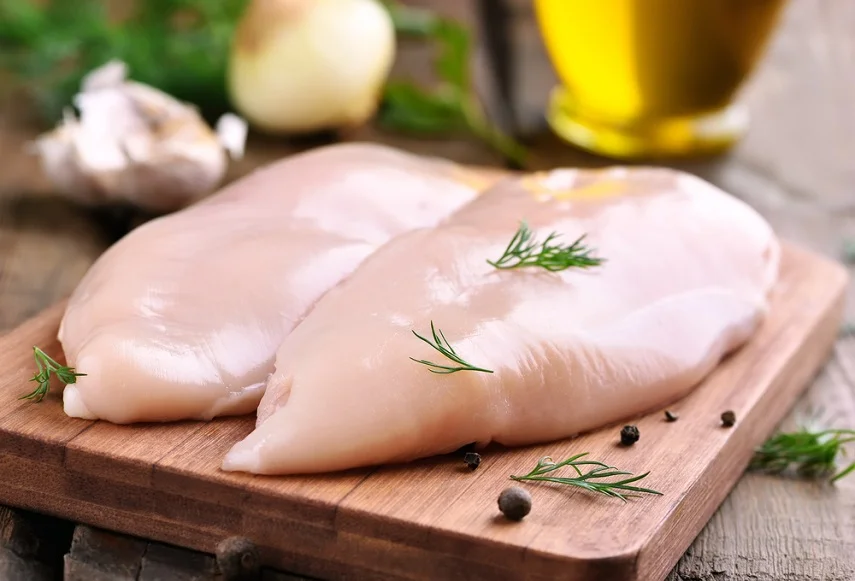
“Chicken breast is lean meat and contains about 31 grams of protein per 100 grams, which makes it an excellent source of protein.”
Chicken breast is a common type of meat that is often eaten and is thought to be a good source of protein. Chicken breast is a great way to get more protein, especially for people who want to build muscle or who are trying to heal from an injury or surgery.
Chicken breast is also a good source of Vitamin B3, Phosphorus, and Selenium, which are all important nutrients. Niacin, which is another name for vitamin B3, helps keep your skin, nerves, and digestion healthy. Phosphorus, on the other hand, is needed for strong bones and teeth. Selenium is an antioxidant that helps keep cells from getting damaged and also helps with metabolism. Chicken breast is also low in fat, which makes it a good choice for people who want to stay at a healthy weight or lower their cholesterol levels. It can be cooked in many different ways, like on the grill, in the oven, or in a pan. It can also be added to salads, sandwiches, and soups.
Overall, chicken breast is an excellent source of high quality protein and other essential nutrients, making it a great choice for anyone looking to improve their overall health and well-being. It is a lean meat that can be easily incorporated into a variety of meals and is a convenient and delicious way to add more protein to your diet. It is a great option for those looking to increase their protein intake and can be a great addition to a balanced diet.
Eggs

“One large egg contains about 6.3 grams of protein, making it an easy and convenient way to get a significant amount of this nutrient in your diet.”
Eggs also have a lot of other important nutrients, like vitamins A, D, and B12, as well as minerals like selenium and choline. The egg yolk has a lot of these nutrients, and many experts say that eating the whole egg is the best way to get the most nutrition out of it. Eggs are versatile food that can be cooked in many different ways, like scrambled, boiled, poached, or fried. This makes them a convenient and tasty addition to any meal. Overall, eggs are a great choice for anyone who wants to improve their overall health and well-being because they are a great source of high quality protein and other important nutrients.
Almonds
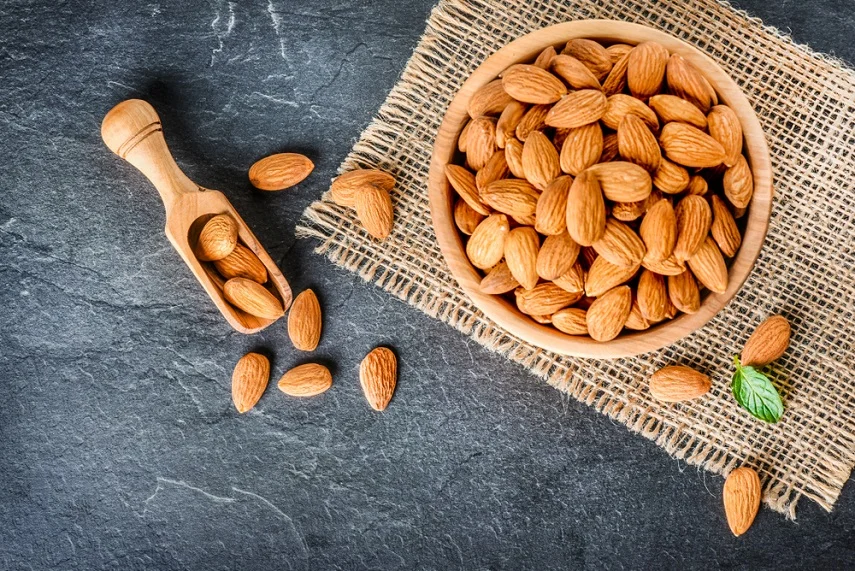
“Almonds contain about 6 grams of protein per 100 grams, which is about 14% of their total weight.”
Almonds are a type of nut from a tree. They are known for being healthy and a good source of protein. Almonds are a good choice for vegetarians and vegans who want to get their protein from plants, as well as for people who want a snack that will keep them full for a long time.
Almonds are full of important nutrients like healthy fats, fiber, vitamin E, magnesium, and manganese, in addition to protein. Together, these nutrients have a number of health benefits, such as lowering the risk of heart disease, keeping blood sugar levels in check, and helping the body digest food well. Almonds also have few carbs, which makes them a good choice for people on a low-carb diet. They are also safe for people with celiac disease or gluten intolerance because they do not contain gluten. Almonds can be eaten raw, roasted, or as almond butter. They can also be added to foods like oatmeal, yogurt, smoothies, and salads.
Overall, almonds are a great source of protein, healthy fats, fiber, and other essential nutrients. They are a convenient and tasty way to add more protein and other important nutrients to your diet. They are versatile and can be enjoyed in many different ways, making them a great choice for people looking for a nutritious and satisfying snack or addition to their meals.
Cottage cheese
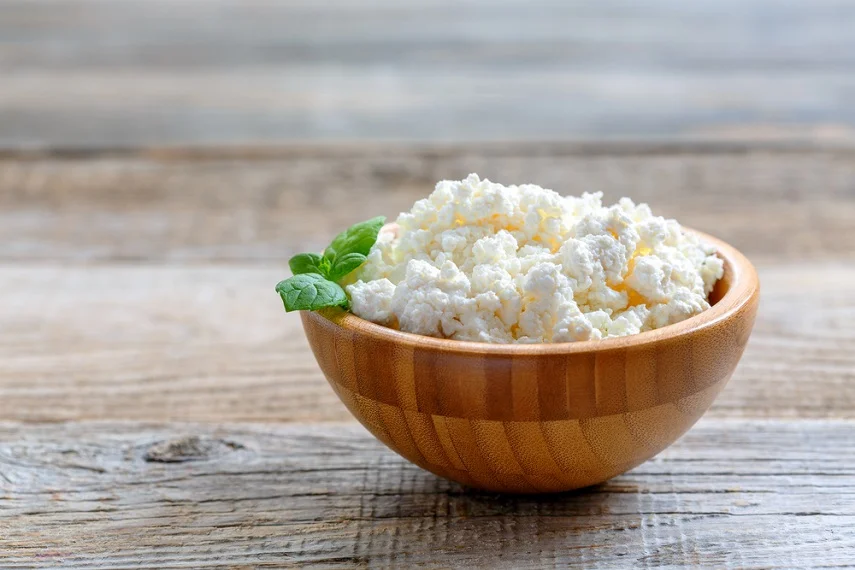
“One cup of cottage cheese contains approximately 14 grams of protein, which is about 28% of the recommended daily intake for a person consuming a 2,000-calorie diet."
Cottage cheese is a good source of protein. The protein in cottage cheese is also considered to be of high quality, as it contains all of the essential amino acids that the body needs to function properly.
Cottage cheese also has a low number of calories, which makes it a good choice for people who want to eat more protein without eating too many calories. It is also a good source of calcium and phosphorus, which are important for keeping bones strong. Cottage cheese is also often made with low-fat milk, which makes it a good choice for people who want to eat less saturated fat.
Milk
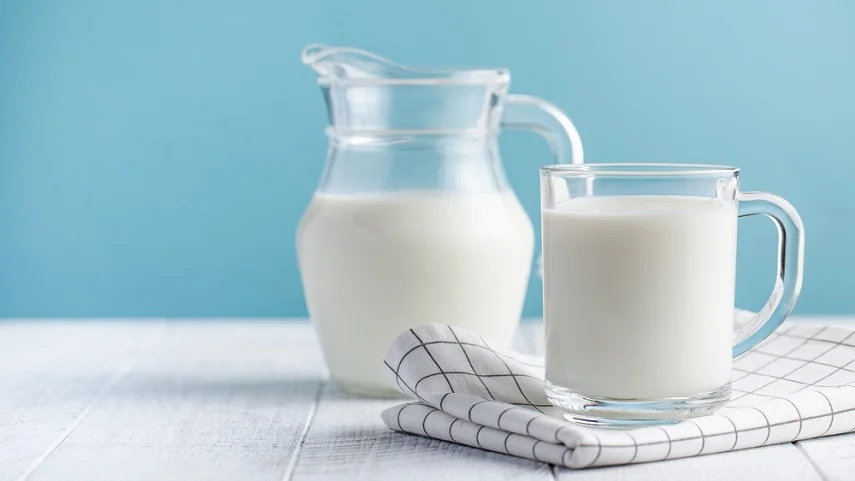
“One cup of milk contains about 8 grams of protein, which is nearly equivalent to the amount of protein found in one large egg.”
Milk has a lot of protein in it. Milk protein is a "complete protein" because it has all of the essential amino acids that our bodies need to build and repair muscle tissue. Additionally, milk protein is easily digested and absorbed by the body, making it a great option for people who are looking to increase their protein intake.
Milk has a lot of important nutrients, like calcium, potassium, and Vitamin D, in addition to the protein it has. These nutrients are important for keeping your bones and teeth healthy and for making sure your muscles work right. Milk is also a good source of Vitamin B12 and other B vitamins, which are important for keeping your energy up and your health in general. Milk is a good choice for people of all ages because it has a lot of good nutrients. It can be part of a healthy diet.
It is worth mentioning that cow's milk is not the only source of milk, there are other alternative options such as soy milk, almond milk, oat milk, rice milk, and others that are also a good source of protein, although the amount of protein may vary depending on the type of milk.
Fish
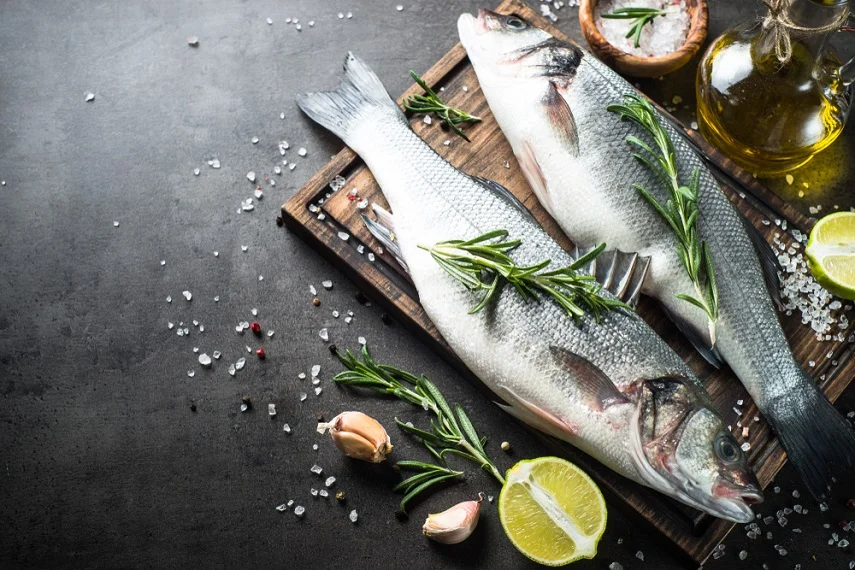
“The amount of protein in fish varies depending on the species, but on average it contains about 20-25 grams of protein per 3.5 ounces (100 grams) serving.”
Fish has a lot of protein in it. Fish has high quality protein that is easy to absorb and has all of the essential amino acids that our bodies need. Fish is also a lean source of protein, which means it's low in calories and fat. This makes it a healthy choice for people who want to eat more protein but don't want to eat more fat and calories.
In addition to its protein content, fish is also a rich source of omega-3 fatty acids, which have been shown to have numerous health benefits. These benefits include reducing the risk of heart disease, improving brain function, and reducing inflammation. Fish is also a good source of vitamins and minerals, including vitamin D, vitamin B12, and selenium. Eating fish regularly can provide many health benefits and is an excellent way to increase your intake of high quality protein.
Pumpkin seeds
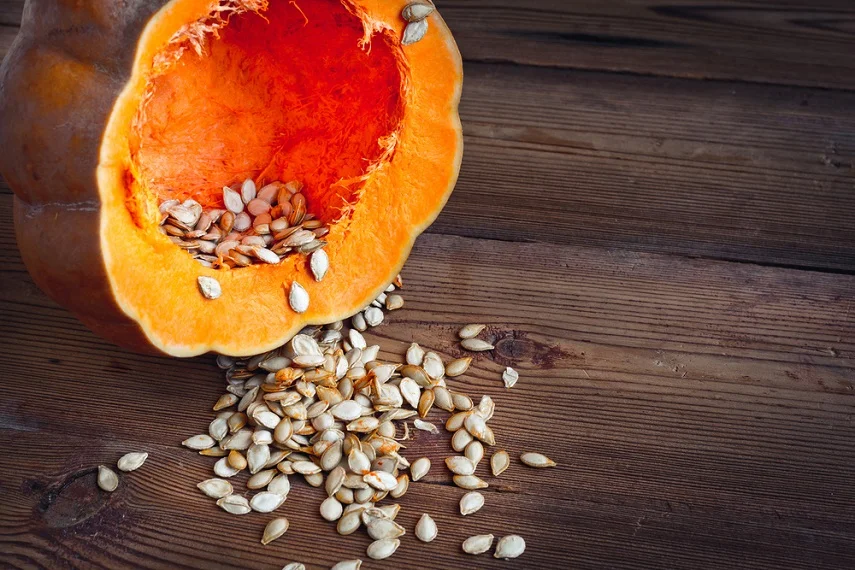
“Pumpkin seeds contain about 7 grams of protein per 1/4 cup serving, making them a valuable addition to a vegetarian or vegan diet.”
Protein can be found in pumpkin seeds. Pumpkin seeds are also a good source of healthy fats and minerals like zinc and magnesium, which are important for overall health.
Pumpkin seeds are not only a good source of protein, but they are also easy to use in many different dishes. You can eat them as a snack, put them in salads or yogurt, or put them on oatmeal or cereal. They can also be ground up and used as a coating for fish or chicken, or mixed into bread or cookie dough. Overall, pumpkin seeds are a healthy way to get more protein into your diet which is also easy to do.
Lean beef
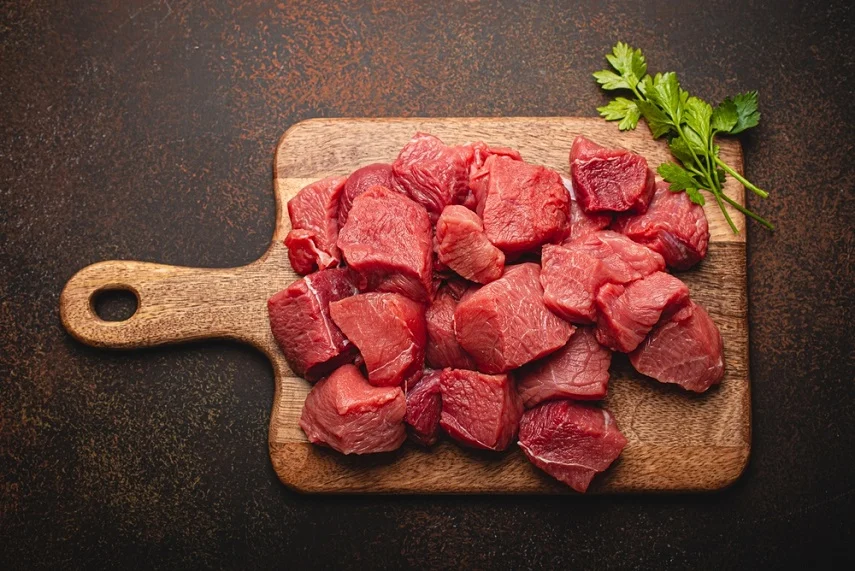
“Lean beef typically contains around 26 grams of protein per 3.5 ounces (100 grams) of cooked, trimmed meat. However, the exact amount of protein can vary depending on the cut of beef and how it is prepared. For example, a 3-ounce (85-gram) serving of sirloin steak contains about 26 grams of protein, while the same serving of ground beef can contain up to 22 grams of protein.”
Lean beef is a good protein source. It has a lot of high quality protein, which is important for keeping the body's tissues healthy and helping them heal. Lean beef is a good source of protein, iron, zinc, and B vitamins, all of which are important for keeping your health in good shape.
Choosing lean cuts of beef, like round, sirloin, or tenderloin, can help you eat less fat overall. But it's also important to think about portion sizes when eating lean beef. Since eating too much can lead to weight gain. Eating lean beef in moderation as part of a balanced diet can provide the body with the necessary nutrients while also helping to achieve a healthy weight.
Greek yogurt
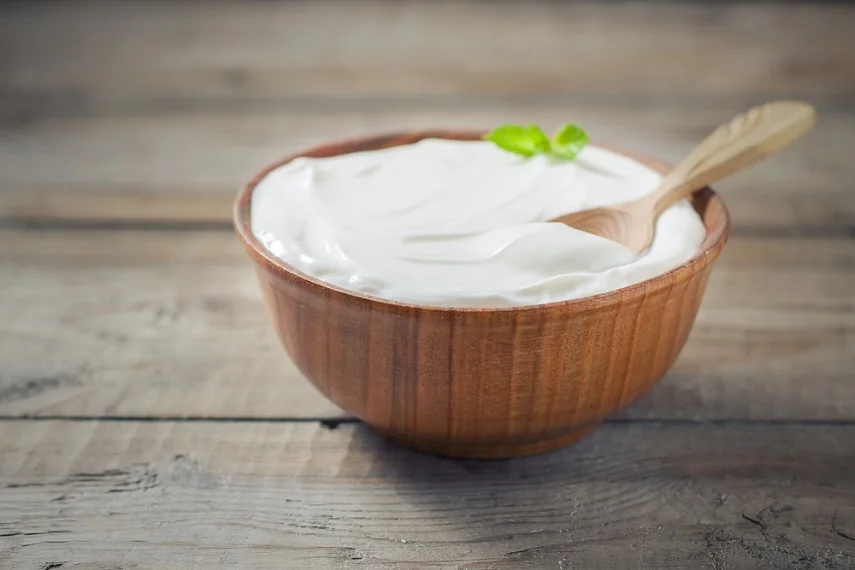
“The amount of protein in Greek yogurt can vary depending on the brand and the specific product. On average, Greek yogurt contains around 12-20 grams of protein per serving (100-170g).”
Greek yogurt is an excellent source of protein. It is made by straining regular yogurt to remove the whey, which results in a thicker and creamier consistency. This process also increases the protein content, as Greek yogurt typically contains about twice as much protein as regular yogurt. Additionally, Greek yogurt is also a good source of calcium and probiotics.
Greek yogurt can be a healthy and convenient way to boost your protein intake. It can be enjoyed on its own as a snack, or used as a substitute for sour cream or mayonnaise in recipes. Greek yogurt can also be paired with fruits and granola to make a satisfying breakfast or dessert. However, it is important to pay attention to the sugar content of the Greek yogurt you're consuming, as some brands may add a significant amount of sugar. Opt for plain Greek yogurt or flavored Greek yogurt with lower sugar content.
Black beans
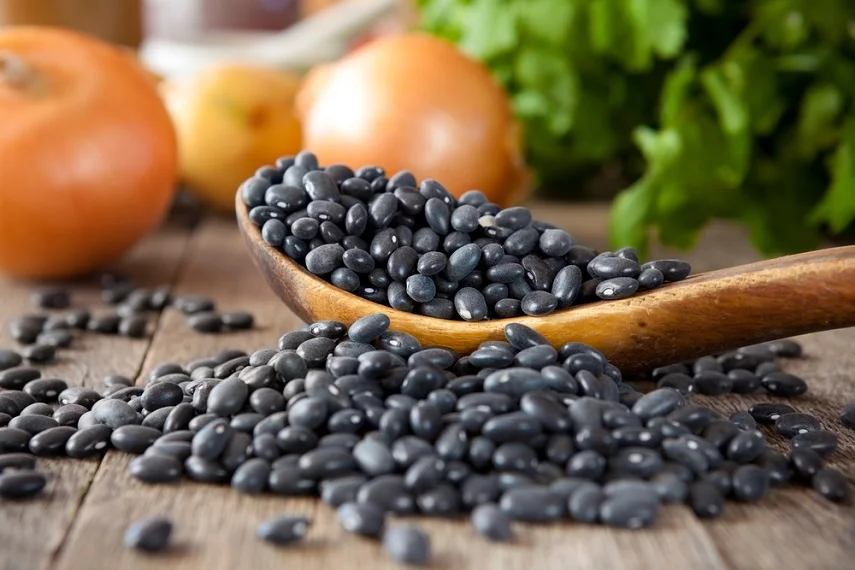
“A 1-cup serving of cooked black beans contains about 15 grams of protein, which is about 30% of the daily value for protein.”
Black beans are a good source of protein. They are a plant-based protein source, making them a great option for vegetarians and vegans.
In addition to being a good source of protein, black beans are also a rich source of other essential nutrients such as fiber, folate, iron, potassium, and magnesium. Black beans is a high fiber food that can help with digestion and maintaining a healthy weight, while folate and iron can support the formation of red blood cells and the immune system. Black beans also have a low glycemic index, which makes them a good choice for people with diabetes or those who are looking to regulate their blood sugar levels. They are also low in fat and cholesterol-free.
Overall, black beans are a versatile, nutritious, and great source of plant-based protein that can be included in a variety of dishes, such as salads, soups, stews, and burritos. They are a great way to add more plant-based protein to your diet without consuming a lot of fat and calories.
Bottom Line
Getting enough protein every day is very important for good health. People's protein needs vary. But experts say that most active people should eat 0.54–0.9 grams of protein per pound of body weight (1.2–2 grams per kg) per day.
Thankfully, there are lots of high protein foods available, including both animal and plant-based options. Try eating some of the foods on this list that are high in protein to help you meet your daily needs.













